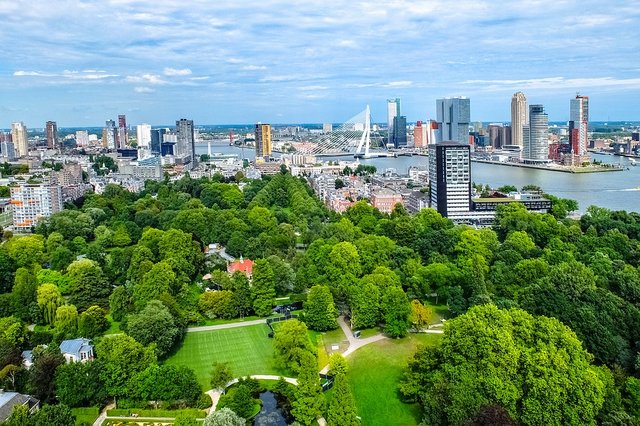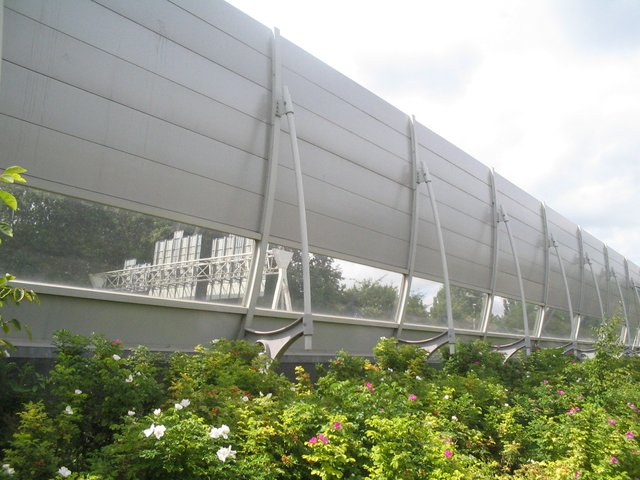Air pollution is not the only environmental problem that has detrimental effects on our health and the environment, noise pollution is a growing danger in cities that puts us at risk because according to the World Health Organization (WHO), this type of pollution is one of the environmental factors that causes more health problems, and not only affects people, also has a great impact and remarkable adverse effects on different animal species living near large urban centers.

Noise in cities causes more damage than expected. Source: wikimedia.org.
And the recent report "Frontiers 2022: Noise, Flames and Imbalance" published last Thursday, February 17 by the United Nations Environment Programme (UNEP), highlights that urban noise pollution is becoming a major threat to public health, and is causing disruptions in some stages of the life cycle of natural systems.
Noise and its effects
According to the WHO, noise is defined as any sound above 65 decibels (dB), being harmful when it exceeds 75 dB and painful when it exceeds 120 db; that is why it is not recommended to be exposed to more than 65 dB during the day, and to have a good rest at night, noise at night should not exceed 30 dB.

It is not recommended to be exposed to sounds higher than 65 dB. Source: maxpixel.com.
And in cities, prolonged and high level noise from vehicular traffic, railroads, construction activities and even people's leisure activities are becoming more and more common, affecting more people who suffer from chronic discomfort and sleep disturbances. And these annoyances and disturbances are then the cause of cardiac, metabolic, auditory and even mental illnesses, as noise can provoke episodes of stress, fatigue, depression, anxiety or hysteria.
According to this report, noise pollution causes 48,000 new cases of ischemic heart disease and the premature death of 12,000 European people each year; and the noise measured in commercial and high-traffic areas of many cities around the world already exceeds acceptable noise levels. For example, in New York, the report indicates that people are exposed to 95 dB, in Algiers to 100 dB, in London to 86 dB, Damascus 94 dB, in Moradabad 114 dB, Ho Chi Minh 103 dB, and among Latin American cities Puerto Vallarta, Mexico with 85 dB and Bogota, Colombia with 83 dB stand out. Young people, the elderly and marginalized communities living near busy highways or industrial areas are most affected.

In the high traffic commercial areas of many cities, noise exceeds the recommended limits. Sorce: wikimedia.org.
But these groups of people are not the only ones affected, as animals living in urban environments, such as birds, insects and reptiles, also suffer the consequences of noise pollution, as ambient noise disrupts their acoustic communication, affecting their behavior, reducing their ability to hear their predators approaching, and also interfering with their mating. Even our pets can suffer from episodes of stress and anxiety due to noise.
How to combat noise
Noise from automobile traffic, airplanes, industrial activities, and noise from residential concentrations may be very difficult to eliminate from our urban environment, however in the same report the UN proposes as a solution, to increase green areas in cities.

Vegetation helps to dissipate noise. Source: pixabay.com.
Vegetation is capable of absorbing acoustic vibrations and dispersing noise, as well as amplifying natural sounds. Tree belts, shrubs, green walls and green roofs have positive visual effects, attracting wildlife and improving the visual streetscape.
Even electric vehicles emit noise as they roll along roads, so measures such as noise barriers along roads, railroad tracks, earth berms, gabions, and the use of soundproofing materials can help break the chain of noise propagation.

Road noise barrier in the Netherlands. The transparent section reduces the visual impact on drivers. Source: wikipedia.com.
Ultimately, noise reduction is a matter of public health, and urban planners are therefore obliged to create and preserve more and more quiet spaces, which increase natural sounds in addition to providing pleasant cityscapes, since both sight and sound influence the positive perception of the environment. And vegetation barriers are an ingenious solution based on nature itself, ideal for generating pleasant soundscapes.
Thanks for coming by to read friends, I hope you liked the information. See you next time.

Hello @emiliomoron
This article is very interesting where they are calling us to reflect and create awareness, reduce noise is a matter of health both public and for ourselves, the humus emitted by cars where carbon dioxide emerge into the atmosphere where a quantity of biotanol emerges and is harmful to health, and also contributes to the increase of global warming to the planet.
Thank you for your article
Greetings
Downvoting a post can decrease pending rewards and make it less visible. Common reasons:
Submit
Hello @emiliomoron
Indeed, Bogota is a very noisy city, and also the air pollution by smoke from cars is quite high. I recently moved to an area farther away from the cars, highway, and I felt the difference in the change.
But it was not clear to me that the noise could even affect my heart. Looking at it this way, it is a big public health problem, as you point out in the post.
Downvoting a post can decrease pending rewards and make it less visible. Common reasons:
Submit
Hello @josevas217. I have read about the pollution problems in Bogota, good that you have been able to move to an area farther away from the traffic, it certainly makes a difference to be in a less noisy place.
Downvoting a post can decrease pending rewards and make it less visible. Common reasons:
Submit